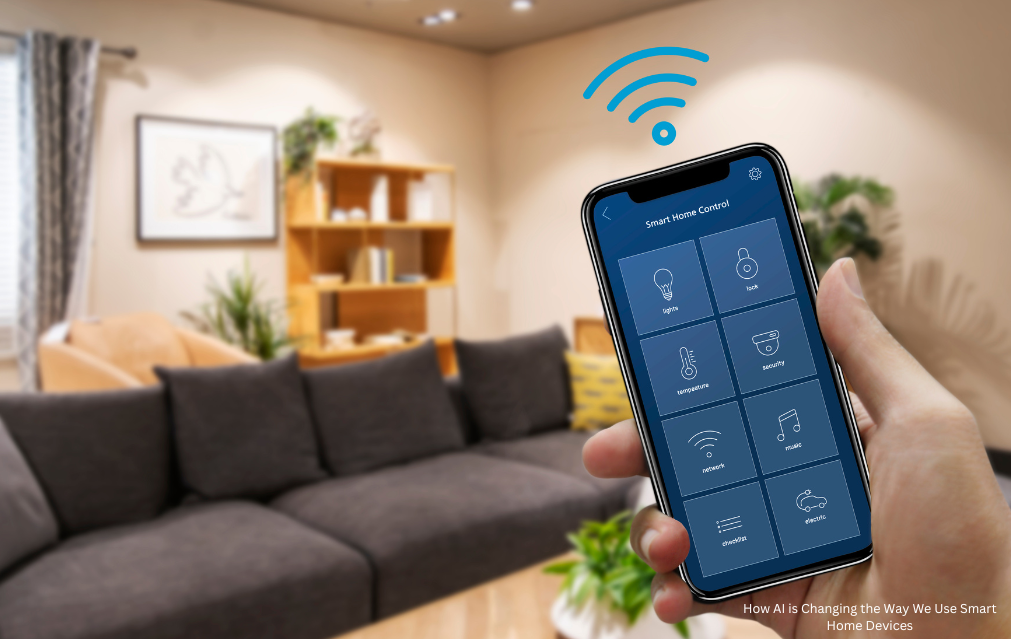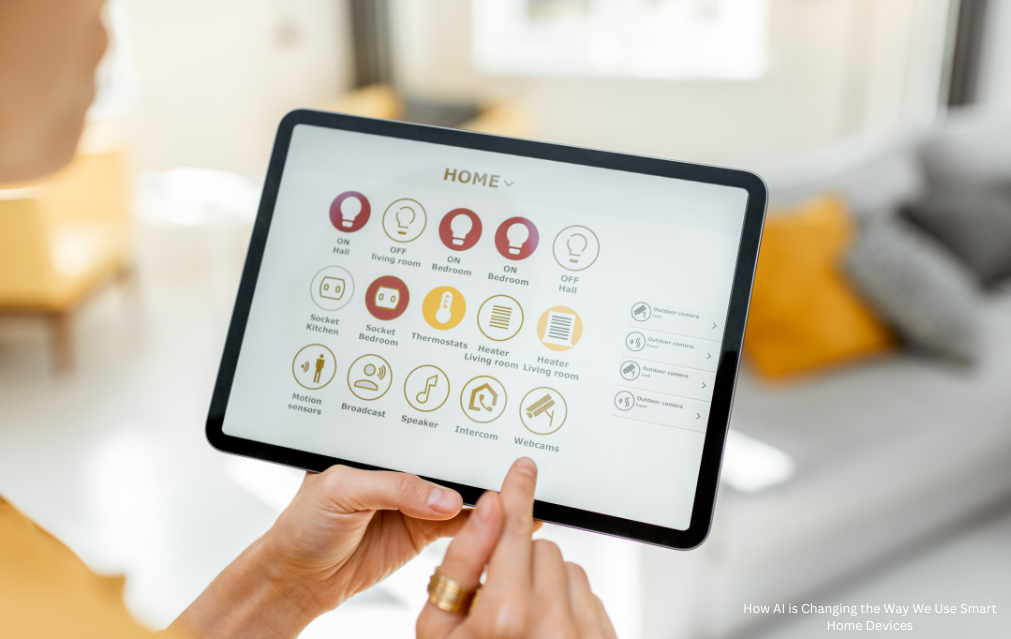Imagine walking into your home, and the lights turn on just the way you like. Your coffee machine starts brewing, and the thermostat adjusts to the perfect temperature—all without you lifting a finger. Sounds like science fiction? It’s not. This is the power of AI in smart homes.
For years, smart home devices required manual controls or simple automation. But they often lacked true intelligence. People struggled with complex settings, unreliable voice commands, and devices that couldn’t learn from their habits. Home automation felt more like a gadget than a truly smart experience.
Now, AI is changing everything. From voice-controlled assistants to predictive home security, AI-powered smart homes are becoming more efficient, intuitive, and secure. This blog will show you exactly how AI is transforming the way we interact with our homes—making life easier, safer, and more connected than ever.
Let’s dive into the exciting world of AI-driven smart devices and see what the future holds!

The Evolution of Smart Home Technology
Not long ago, home automation was simple. People used timers to turn lights on and off. Remote controls helped operate TVs and ceiling fans. These early systems offered convenience but lacked intelligence. They could not learn or adapt to a person’s lifestyle.
Then came the internet, and things started to change. Home automation systems became smarter with the introduction of Wi-Fi-connected devices. People could control their thermostats, lights, and security cameras from their phones. This was a big step forward, but these devices still needed manual input.
Today, AI has taken smart homes to a new level. Intelligent home automation learns from daily routines. AI-driven smart devices adjust settings without manual effort. A thermostat knows when you are home and sets the perfect temperature. A smart speaker understands your voice and plays your favorite songs. AI home security systems detect unusual activity and alert you instantly.
The numbers prove this technology is growing fast. In 2023, over 700 million smart home devices were in use worldwide. Experts predict that by 2028, the market will be worth over $200 billion. More people are choosing AI-powered smart homes because they make life easier, safer, and more energy-efficient.
Smart home technology is no longer just about convenience. It is about intelligence. The future is here, and AI is making homes smarter than ever.
AI-Powered Smart Homes: What’s Changing?
Smart homes are getting smarter. AI is learning how people live and making homes more comfortable. It watches daily routines and adjusts settings without being asked. If you wake up at 7 AM, your smart lights can turn on slowly. If you lower the thermostat every night, AI will remember and do it for you.
Machine learning is behind these changes. AI studies patterns and improves over time. A smart thermostat like Google Nest learns when you are home and sets the temperature just right. Amazon Alexa understands your voice and plays music, controls lights, and answers questions. Apple HomeKit connects devices, letting them work together.
These smart systems save energy, reduce effort, and create a home that adapts to you. AI is not just about automation—it is about intelligence. It makes homes more personal, more efficient, and more connected than ever before.
AI-Driven Smart Devices: A New Era of Automation
Smart devices are no longer just tools—they are decision-makers. AI-powered gadgets now handle tasks without needing constant input. From adjusting room temperature to restocking groceries, AI is making homes more efficient.
Smart thermostats like Google Nest and Ecobee learn daily habits. They adjust heating and cooling based on schedules and weather. This saves energy and keeps the home comfortable. Smart refrigerators track food usage. Some models suggest recipes based on what’s inside. Others create shopping lists and order groceries automatically.
AI also predicts what users need before they ask. A coffee maker starts brewing as soon as the alarm rings. Lights dim in the evening to create a cozy atmosphere. AI studies routines and fine-tunes settings for better comfort.
Energy management is another big change. Smart plugs and appliances detect power usage and reduce waste. AI-driven systems suggest ways to cut electricity costs. In some homes, solar panels work with AI to store energy for peak hours.
Automation is no longer just about convenience. AI is making homes smarter, greener, and more responsive to daily life.
Voice-Controlled Home Technology: The Rise of AI Assistants
Talking to a device and getting an instant response felt like a dream years ago. Today, it is part of everyday life. AI-powered voice assistants like Amazon Alexa, Google Assistant, and Apple Siri are changing how people interact with their homes. They play music, set reminders, control lights, and even lock doors—all through simple voice commands.
AI has made these assistants smarter. Natural Language Processing (NLP) helps them understand accents, tones, and even incomplete sentences. They no longer just recognize words; they understand meaning. This makes conversations with smart devices feel more natural.
Smart speakers are now in millions of homes. In 2023, over 500 million voice assistants were active worldwide. Studies show that more than 60% of users rely on them daily. As AI continues to improve, voice-controlled technology will become even more accurate, helpful, and essential in smart homes.
AI Home Security Systems: Enhancing Safety
Home security is smarter than ever. AI now protects homes with facial recognition, motion detection, and smart alerts. It learns who belongs and who doesn’t. If a stranger approaches, AI sends an instant alert. If it’s a family member, the system stays silent.
AI-powered surveillance cameras record in real time. They track movement and store important footage. Smart doorbells like Ring and Nest let homeowners see visitors from anywhere. AI can even recognize package deliveries and notify users.
False alarms used to be a big problem. Pets, shadows, or passing cars could trigger alerts. AI now analyzes patterns and detects real threats. It knows the difference between a burglar and a cat walking by. This makes security more reliable and less stressful.
With AI, home protection is faster, smarter, and more accurate. It watches over homes so people can feel safer every day.

The Future of AI in Smart Homes
Smart homes will only get smarter. AI is moving beyond simple automation. Self-learning AI will adapt to users even better. It will predict needs without commands. Homes may soon adjust lighting, temperature, and security based on emotions and routines.
Blockchain integration could improve security. AI systems will store data in a safer way, making hacking harder. Experts believe that blockchain can also help devices communicate directly without relying on big tech companies.
With more AI power comes new concerns. Privacy is a big issue. Smart devices collect personal data every day. If not protected, this data can be misused. Security risks are also growing. Hackers may try to take control of AI-powered homes.
Experts say AI must be transparent and controlled. A 2023 study by MIT found that 80% of users worry about AI making important home decisions. People want more control over smart home AI. The future is exciting, but AI must be safe, fair, and reliable.
Conclusion
AI is transforming smart homes in ways that were once unimaginable. It learns routines, enhances security, and saves energy. From voice assistants to self-learning thermostats, AI-powered devices make life easier and more comfortable. Home security is also smarter, with facial recognition and motion detection reducing false alarms.
Energy efficiency has improved too. AI helps cut electricity costs by automating lighting, heating, and cooling. As technology advances, smart homes will become even more intuitive and secure.
Now is the time to explore AI-driven home automation. Upgrading to smart devices can improve daily life, increase safety, and reduce energy waste. The future of smart living is here—why not be part of it?
